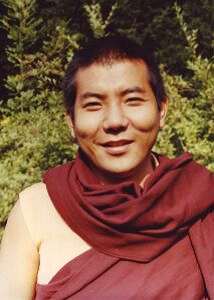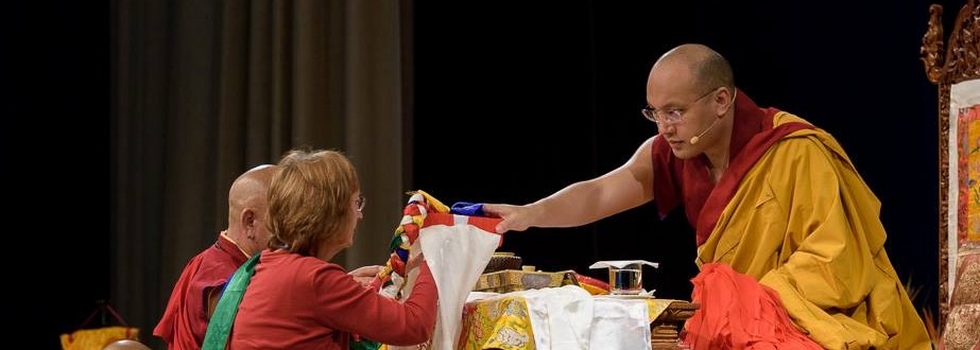The True Nature of Ones Mind

His Eminence Jamgon Kongtrul Rinpoche the Third,
Karma Lodrö Chökyi Senge
Presented in Bern, Switzerland, 1991
There are many religions in the world and so there is an immense variety of approaches to establish the mutual wish that everyone has in common, which is to experience peace and well being. Although all religious proponents share the same goal, the practices they offer vary. I will speak about the Buddhist approach to peace and genuine happiness.
Lord Buddha presented innumerable teachings, which are summarized in The Three Pitakas. The first instructs followers about ethics, the second meditative absorption, and the third superior knowledge or discriminating wisdom-awareness. The essence of the entire body of Lord Buddha 's teachings is contained in these three baskets of trainings. What is the ultimate purpose of all teachings?
The most important theme to understand in Buddhism is that all outer and inner phenomena, i.e., all appearances and experiences, are not different than or separate from one 's own mind. Therefore, realization of one 's own mind is the quintessence of Buddhism and the sole purpose of Lord Buddha 's teachings. As long as one ignores the true nature of one 's own mind, realization cannot be and peace and well being will remain a thing of naught. The only aim of a Buddhist devotee is to realize the true nature of his or her own mind by engaging in the three trainings.
One leads one 's life based upon the wish to experience happiness and not to experience pain, erroneously assuming that outer circumstances and conditions are responsible and will satisfy this purpose. Whenever one runs into difficulties or experiences discomfort or pain, one automatically looks outside oneself and blames others. One also looks outside oneself when one hopes to experience happiness. Again, one turns one 's attention outwards and concentrates on material objects or other persons in one 's quest to satisfy one 's hopes and relinquish one 's fears . Since nothing is separate from one 's own mind, one will never have reliable happiness or be able to eliminate suffering and pain through outer means. Nevertheless, one does not shy away from any hardships and efforts while seeking to have a pleasant life.
As it is, one focuses one 's attention on persons or things outside oneself and is very attached to them. It is a grave error to think that outer things or persons will bring lasting happiness. All phenomena are composed due to the coming together of many causes and conditions and as a result do not last. Relative reality only exists due to the law of interdependence and therefore everything appears on a relative level of perception and cognition, too. It is not due to outer objects or persons that one experiences peace, because it is one 's mind that perceives and experiences everything. It is clear that any joy that arises from experiencing one, a few, or all of the eight worldly dharmas will never make one content for a very long time, and so, when one is disappointed and unhappy again, one will want something else or more of what one has already. The eight worldly dharmas that seduce the mind are pursuit of gain, praise, eulogy, and joy as well as fear of loss, defamation, ridicule, and sorrow. It is evident that outer things will never bring lasting satisfaction and therefore one realizes that contentment can only be an inner experience of the mind. This is the quintessence of the Buddha 's teachings he showed followers how to train their mind so that they are able to realize their mind 's true nature and as a result experience perfect happiness and peace, which is never attained within the scope of fleeting aims. He showed that it is very important to realize the nature of one 's own mind, which is the topic of my talk.
On the one hand, it is easy to discuss the nature of the mind; on the other hand, it is a very profound topic. For a Buddhist, someone who has realized the true nature of his or her mind is a Buddha - and it is not easy to become a Buddha. It can only be realized through innate, self-aware wisdom.
Realization of mind 's innate self-awareness is referred to using different terms for the sake of a better understanding and depending upon the context. It is called "ultimate wisdom, " prajnaparamita in Sanskrit. Many terms refer to mind 's true nature, which in truth is inconceivable and ineffable. Mind 's true nature is beyond ordinary and conditioned perception and cognition and any word that describes it certainly functions on a conventional level. Since mind 's true nature is beyond the realm of conditionality, it really cannot be defined or described adequately with words. It is impossible to determine mind 's colour, shape, or size, because it is insubstantial and unconditioned. It is free of arising, abiding, and ceasing, and this is the reason why mind 's essence is devoid or empty of inherent existence, called "emptiness. " Yet, the mind possesses the ability to perceive and know and this is due to mind 's innate nature, called "clarity " or "self-awareness. " Although beyond conceptuality, both terms are an appropriate description of the mind, which is in essence emptiness and in nature clarity.
Now, emptiness does not mean nothing but is the "domain " (that has no location and is not restricted in any way) in which the mind is able to ascertain the entirety of its own nature and to express itself in its richness and fullness without any hindrances. Self-aware cognition or realization and unimpeded manifestation are attributes that describe mind 's innate radiance. It is the mind that embraces and encompasses all appearances and experiences in samsara and nirvana, "bondage " and "liberation. " Nothing is ever separate from one 's mind, since the mind can penetrate all things.
In short, one 's mind is the inseparability of emptiness and clarity, i.e., the union of its essence and nature. Since it is the inseparability of emptiness and unimpeded clarity, it can permeate all things, and therefore everything that can be perceived and known is not distinct or different than one 's own mind. This doesn 't mean to say that one 's mind creates the phenomenal world, rather it has the capacity to realize and embrace all objects that can be perceived and known, and therefore there is nothing within samsara and nirvana that is not mind 's true nature.
Again, the indivisibility of emptiness and clarity is the true nature of one 's mind, clarity being the lucid quality of self-awareness. Every sentient being experiences brief moments of his or her true nature daily, but many individuals aren 't trained to notice. Why? Because they are overwhelmed by a pluralistic mode of apprehension, which the Third Gyalwa Karmapa, Rangjung Dorje described in The Mahamudra Prayer when he wrote:
"The self appearances that never existed are eluded as objects.
Overwhelmed by ignorance, self-awareness is reified as the subject.
Under the sway of clinging to duality, we wander in the expanse of cyclic existence. "
This is to say that as long as one does not realize mind 's empty essence and unimpeded clarity, one separates one 's experiences into an apprehending subject and apprehended objects. Clinging to a subject (a self) and objects (others) is the initial error that hinders one from realizing the unimpeded lucidity of wisdom that shines forth from within everyone but for brief moments every day. This was a short presentation of the mind 's true nature, the quintessence of Lord Buddha 's teachings.
There are many methods and approaches on the path to Buddhahood so that one perfectly experiences and realizes the true nature of one 's own mind. The main practices of training one 's mind involve developing and maintaining mindfulness and awareness so that one is able to recognize one 's mistaken mode of apprehending concrete and abstract phenomena, which cause one to cling to duality. Clinging to duality engenders all disturbing emotions that move one to act the way one does and to accumulate unbalanced and harmful habits. Because of the ensuing disturbing emotions, one is not able to rest at ease in the true nature of one 's mind and so lives one 's life bereft of awareness. One needs to notice one 's dualistic way of thinking and seeing oneself and the world by practicing the techniques that the Buddha offered so generously and freely. Practice enables a disciple to become aware of the true nature of all things, which is the purpose of all teachings that help one overcome discontent and, instead, live a meaningful life.
Lord Buddha presented methods by which one can learn to diminish and bring to cessation one 's negative habits and to engage in beneficial activities for the welfare of oneself and others. Ultimately, one can eliminate unwholesome habits, which necessarily arise from a dualistic mode of apprehension one can achieve the unimpaired state that is called "Buddhahood. " The purpose of every Buddhist practice is developing and increasing one 's awareness so that one overcomes duality that brings on so much frustration and pain.
There is another decisive factor one needs to remember while on the journey to Buddhahood, namely the development of a wholesome attitude, referred to as "the mind of enlightenment, " Bodhicitta in Sanskrit. Bodhicitta is the sincere intention to attain enlightenment for the welfare of all living beings. One needs to know that the aspiration and application of the mind of awakening are never separate or different than the true nature of one 's own mind. I spoke about the fact that the true nature of one 's mind is the indivisibility of emptiness and lucidity, i.e., unimpeded clarity. Bodhicitta is this union, nothing else. It is the manifestation of unimpeded clarity, which is all-encompassing, great loving kindness and compassion. Developing and increasing one 's loving kindness and compassion for all sentient beings is so important and is the principal teaching in Buddhism. In order to attain Buddhahood, one needs to realize one 's mind 's true nature, which is, as said, the indivisibility of wisdom-awareness of emptiness and unimpeded manifestation of mind 's lucidity and therefore is immeasurable.
Accomplishing Buddhahood depends upon training and taming one 's mind so that one becomes free of emotions that are so distracting and painful. As it is, one 's mind is concealed by the veils of disturbing emotions and consequently has no control in that it is overwhelmed by delusory distractions. In order to realize the true nature of one 's mind, one needs to pacify and finally dispel the veils of the disturbing emotions that everyone does have. All practices entail a procedural purification that conceal one 's pure nature and are not employed in order to become powerful, rich, or famous. Lord Buddha taught us how to look inwards, how to train and tame our own mind so that we realize our true nature that always and already abides within.
As to The Three Pitakas mentioned above, one first trains one 's mind, which has to do with one 's attitude that, in turn, determines one 's verbal and physical behaviour. Should one 's attitude be wholesome, then one 's activities will be beneficial. Secondly, one trains one 's mind to be at ease by practicing meditation. If one continues following after distractions that unremittingly present themselves, one will not have the mental stability that one needs in order to attain wisdom-awareness, which enables one to realize the true nature of one 's mind. When one realizes the true nature of one 's own mind, then one realizes the true nature of all things.
Samsara is the Sanskrit term for "conditioned existence " and was translated into Tibetan to mean "revolve. " What does this mean? Driven by initial ignorance as to the way things really are and the way everything appears, disturbing emotions arise and cause one to act inadequately. One 's activities are influenced by one 's mind and, depending on one 's actions, one experiences the results. Then habits are intensified and when acted upon subside into one 's ground consciousness, from which they arise again when conditions prevail. The successive chain reaction of cause and effect evolves out of initial ignorance as to the true nature of all things. Ignorance is the characteristic of a deluded mind that apprehends appearances and experiences dualistically; this process is a cause. And the result is samsara that incessantly evolves and revolves. Samsara is actually a state of delusiveness and it keeps one fettered in the cycle of suffering, frustration, anguish, and discontent. Nirvana is freedom from bewilderment and everything it gives rise to. Nirvana is the Sanskrit term that was translated into Tibetan to mean "beyond suffering, " which means to say that nirvana is realization beyond duality.
Questions & Answers
Question: What is bardo after death?
Rinpoche: It would take a long time to explain the intermediate state of death here. There is the bardo between death and birth as well as various other stages. In short, after death the pure aspect of bardo can be experienced if one has practiced and has gained experience during one 's life. One achieves liberation upon realization, the reason one practices the instructions. The bardo of becoming is impure, because one experiences the habitual patterns that determine a new birth. This stage is also called "the uncertain stage of bardo. " So, it is a very extensive subject. The body that consists of the elements collapses at death, while the mind encounters its true nature and never ends.
Question: What does it mean to cling to duality?
Rinpoche: We differentiate between subject and objects and cling to both as real. Every concept one creates by dividing subject and objects is dualism. The cause for this unfortunate process is that one 's mind does not recognize its true essence, which is emptiness, and thus mistakenly identifies the apprehending subject as a self. Furthermore, mind doesn 't recognize its true nature, which is unimpeded clarity, and thus mistakenly identifies apprehended objects as other and different than the mind. For example, one perceives a form and thinks it is other than one 's cognising consciousness and consequently separates the apprehended object from the apprehending subject. One does this as long as one fails to see that all things manifest as the expression of one 's own mind and are therefore not different than one 's own mind. In the process, one judges what one perceives and separates what one thinks is good from what one thinks is bad. Dividing one 's apprehensions gives rise to one 's emotions - desire, attachment, aversion, and so forth, all factors that determine one 's actions. One doesn 't recognize that all things arise in interdependence, are therefore relative, and as a result one automatically perpetuates duality by assuming that things exist from their own side as self-existing entities. One bases one 's life upon this false assumption about conditioned reality. Now, relatively all things appear to sentient beings in accordance with their capacity to perceive and cognise while in one of the six realms of conditioned existence that constitute samsara and are all marked by suffering. All suffering arises from the five primary mind poisons of attachment, aversion, jealousy, miserliness, and pride. On the relative level, there are the six realms of existence; ultimately they do not exist.
One needs to recognize which aspect of Lord Buddha 's teachings are being presented. The instructions on the Four Noble Truths deal with relative reality, those on emptiness address ultimate reality. The final instructions that Lord Buddha imparted speak of the Buddha nature and are extraordinary. If you do not understand the level of teachings that are being presented, you may think that the teachings are contradictory, which is not the case. For example, sometimes it is taught that there is samsara and nirvana. At other times it is said that samsara and nirvana are indivisible. You need to understand why the different levels of teachings are available and presented to students.
Next question: I didn 't understand the three levels of training.
Rinpoche: By practicing meditation one will be able to develop the wisdom that is beyond conditionality, the wisdom-awareness that discerns the ultimate truth of everything. All practices are based on discipline. The three trainings correspond with the three cycles of teachings that Lord Buddha presented. Moral discipline or ethics is taught in the Vinaya, meditative absorption in the Sutras, and wisdom-awareness in the Abhidharma. Of course, they relate to one another and need to be realized progressively.
Thank you very much.

May the life of the Glorious Lama remain steadfast and firm.
May peace and happiness fully arise for beings as limitless (in number) as space (is vast in its extent).
Having accumulated merit and purified negativities, may I and all living beings without exception
swiftly establish the levels and grounds of Buddhahood.
The teachings offered by Jamgon Kongtrul the Third on his last visit to the West and that were hosted by Rigpe Dorje Schweiz were transcribed in 1991, typed anew and edited on New Year 's Day, 2008 for the website of Karma Lekshey Ling Institute and for the archives of Pullahari Monastery in Nepal by Gaby Hollmann, responsible and apologizing for any mistakes. May virtue increase!















